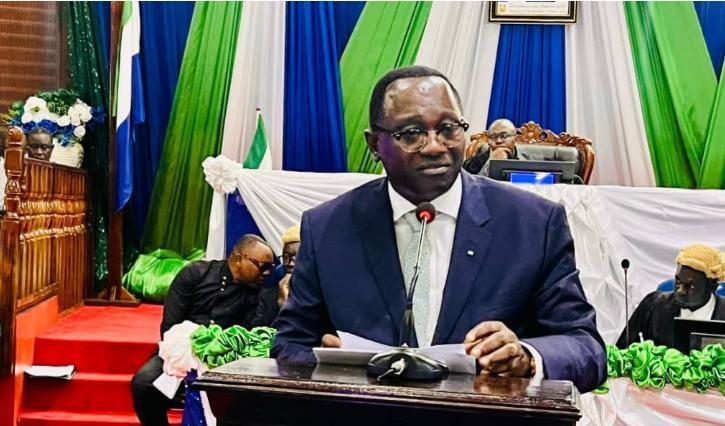Africa-Press – Sierra-Leone. The Parliament of Sierra Leone has on Tuesday, July 29, 2025 extensively debated and passed into law the “Supplementary Appropriation Act 2025,” themed “Fiscal Consolidation and Budget Credibility to Sustain Macroeconomic Stability.”
This move, consistent with Section 112 (3) of the 1991 Constitution and Section 42 (1)(a) of the Public Financial Management (PFM) Act 2016, authorizes additional expenditure from the Consolidated Revenue Fund for the services of Sierra Leone for the remainder of 2025.
The new supplementary budget approves an additional Le14,460,760,400 for the period spanning July to December 2025. This comes after an initial Appropriation Act 2025 that authorized Le27,716,357,400. Notably, the revised budget also includes a downward adjustment of Le871,837,200 from the Consolidated Fund.
Minister of Finance, Sheku Ahmed Fantamadi Bangura, presented the supplementary budget, explaining that revisions were necessitated by shifts in both domestic and global economic conditions following the first six months of budget implementation. He highlighted significant improvements in macroeconomic fundamentals, including lower-than-projected inflation, a stronger Leone exchange rate, and a faster-than-expected fall in treasury bill rates.
Despite these positive developments, Minister Bangura cautioned against heightened global economic uncertainty, citing ad-hoc tariff hikes, ongoing conflicts, declining aid flows, tighter financing conditions, and debt vulnerabilities as threats to sustaining economic stability. He emphasized the need for budget credibility and minimizing debt accumulation, necessitating expenditure adjustments to address shortfalls in domestic revenues.
The Minister stated that the supplementary budget aims to reduce the budget deficit from 3.9 percent to 3.8 percent of GDP. This reduction, he explained, would decrease the government’s borrowing requirements, particularly from the banking system, thereby complementing the Bank of Sierra Leone’s efforts to control inflation, lower Treasury Bill rates, stabilize the Leone, and address debt vulnerabilities.
Providing an overview of the macroeconomic and budgetary performance during the first half of 2025, Minister Bangura reported a steady decline in inflation from 54.5% in October 2023 to 13.8% in December 2024, further reaching a single digit of 7.1% in June 2025. He also noted gains in mineral and agricultural exports, a narrowed trade deficit, and increased gross foreign reserves, contributing to foreign exchange stability.
He reassured Parliament that the supplementary budget would maintain fiscal consolidation in the latter half of the year to preserve these macroeconomic gains, enhance budget credibility, and address debt vulnerabilities, ultimately boosting investor and donor confidence and creating fiscal space for priority sector spending.
The debate saw contributions from various Members of Parliament. Hon. Francis Amara Kaisamba, Chairman of the Finance Committee, commended the Minister and President for the economic viability, citing the decline in inflation and prices. He underscored the National Revenue Authority’s (NRA) performance in revenue generation and emphasized the importance of public sensitization for improved tax collection. He also urged timely disbursement of funds to Ministries, Departments, and Agencies (MDAs).
However, Hon. Aaron Aruna Koroma, Deputy Leader 2 of the Opposition, while commending compliance with the law, expressed a contrary view, labeling the budget an “Austerity Budget.” He pointed out perceived lapses, including delayed budget allocations to local councils, and a “total mismatch” between the supplementary budget, foreign exchange rates, and prices. He specifically decried a reduction in the budget allocated to agriculture and youth employment, warning of potential negative impacts on job creation and growth.
Hon. Mustapha Sellu of Moyamba District defended the Minister’s presentation, highlighting the single-digit inflation and effective management of the exchange rate. He praised the Ministry of Finance and the Bank of Sierra Leone for their management of the economy.
Rounding up the debate, Opposition Leader Hon. Abdul Kargbo described the budget’s theme as “ironical.” He raised concerns about a revenue mobilization gap accompanying the supplementary budget and cited instances of uneven allocations to MDAs. He also expressed worry about the weakening Leone since 2018 and the over-reliance on entities like NASSIT, which he feared could adversely affect pensioners. He urged the government to reduce spending, particularly on travel, and to ensure the Leone regains its past glory.
In conclusion, Leader of Government Business, Hon. Mathew Sahr Nyuma, thanked all MPs for their contributions. He highlighted the government’s achievements, including projections for single-digit inflation and successes in the “blue economy.” He also addressed debt repayment, attributing a significant portion to the former government, and asserted Sierra Leone’s strong economic policies compared to other ECOWAS nations. He encouraged tax compliance, especially for GST, to bolster domestic revenue mobilization and assured that allocations to local councils, including Tonkolili District, have been disbursed. He further claimed the depoliticization of petroleum products has led to lower transportation fares and price stability.
In a related development on the same day, Parliament also debated and ratified a Financing Agreement between the European Commission and the Government of Sierra Leone aimed at sustainable food and agricultural value chain development in the country.
For More News And Analysis About Sierra-Leone Follow Africa-Press






